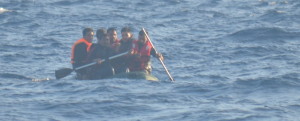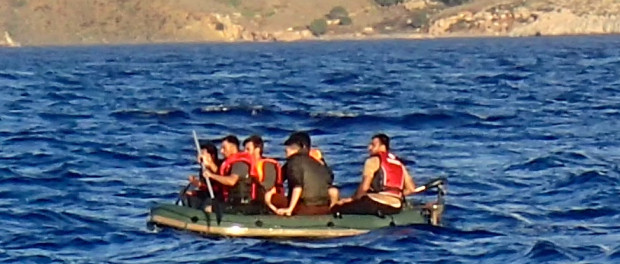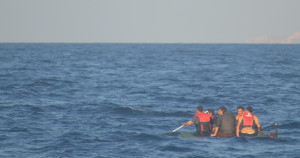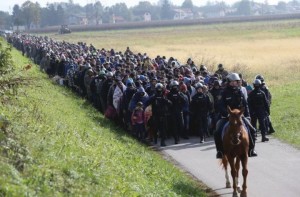Do you have a Refugee Plan?
How dangerous or miserable must life be in your homeland to instead choose a risky paddle across an open sea in an overloaded, inflatable raft to an uncertain future in a country where you don’t speak the language?
Ellen and I sailed last night from Amorgos to Kos, our final port in Greece prior to crossing to Turkey. As the early morning sun rose, we saw six grown men wearing life vests, rowing this inflatable raft across the channel from Turkey to Greece. The sea was relatively calm, but lightning and thunder had filled the channel a few hours earlier, and rain continued off and on all through the day.
The risk these men took was considerable; you can see how low in the water they were. As we passed them they did not wave or call out to us, and showed strong consistent paddling as they were making their way to Kos. They obviously did not want or solicit our help. I am not sure what the Greek laws are relative to picking up or aiding refugees or migrants on shore vs. at sea. For Cubans in the US, if they make it to land they stay, picked up at sea and they go back to Cuba. As there was no immediate threat to the life of the rafters, and there were many vessels in the passage to assist if their fortune changed, we continued on our journey while keeping an eye on them with binoculars. Within 20 minutes, a Greek Coast Guard cutter showed up and made its way to them.
One question Ellen and I have considered is what to do when we encounter people at sea who may have very little left to lose and may be at risk. Here is our general refugee plan for support when we are in sight of land.
Golden Glow’s Refugee Plan when close to shore:
- if there is no immediate threat to life, and no contact requesting help, make no assumptions and continue on, as we would like from others when we are in foreign waters: to be allowed to continue on.
- if there is no obvious threat to life and there is contact requesting help, offer help from a distance and radio the coast guard. If there is concern about the vessel requesting help possibly harming our vessel or crew, then we would just radio in help to local coast guard and standby at a distance. Of course if we thought we could be of aid and do so without risking our lives, then we would do so without hesitation.
- if there is obvious threat to life, then offer all help possible without placing our vessel or crew at risk and of course radio local coast guard. My tolerance for placing Ellen at risk is very low. So our support would most likely be from a distance. Floating lifevests, inflatables, etc. to the vessel in need with a long line and standing by until the coast guard arrives.
It is not easy to tell if there are organized smugglers on board or if all are refugees or immigrants. Desperate people can do irrational things and I take my responsibility for Ellen’s safety very seriously. We are usually only two people on board so we have to be realistic about the possibility of being overpowered and weigh that against our desire to be of aid.
Every situation requires assessment, and of course being in the open ocean might have a very different response then being a mile or two offshore. In this case we were close to shore and all the men had life vests on, and they all appeared to be strong adults. I will never know if they were happy or disappointed to see that coast guard arrive to pick them up.
The reason for the title of the post is to create some discussion of what you might do. I think that if Ellen and I had not talked about this in advance, I would have ‘assumed’ they needed help and attempted to communicate. Who knows what our discussion and potential detainment with the Coast Guard would have looked like if I did. There is value in having a plan in advance so you can act with forethought. There is a good chance you will see many such rafts if you make it to the eastern side of Greece. Hopefully all rafters will be as fit and wearing life vests as those we saw today.
 Of the record 430,000 refugees and migrants that have made the journey across the Mediterranean to Europe so far in 2015, 309,000 have arrived via Greece, according to the International Organization for Migration. With 150,000 refugees arriving to Greece in just July and August alone, the Greek Coast Guard is being placed under extreme duress. Our thoughts go out to those in service: these must be long days for them.
Of the record 430,000 refugees and migrants that have made the journey across the Mediterranean to Europe so far in 2015, 309,000 have arrived via Greece, according to the International Organization for Migration. With 150,000 refugees arriving to Greece in just July and August alone, the Greek Coast Guard is being placed under extreme duress. Our thoughts go out to those in service: these must be long days for them.
It would be wonderful to help solve some of the home country issues that make the risk of fleeing across open seas in open inflatables less than the risk of staying at home. We have plans to do more to help refugees once we get to Turkey. Here in Kos, we did give money to some women with children and go to one of the tent cities tonight and give many of them flashlights. A small drop in an ocean of pain, but at least a few will have money for food and a reading light tonight.
So what is your refugee plan?










You gave more light than just a flashlight my friends. Bless you and bless all of them.
xo
While the gratitude was plentiful from the crowd, we wish we were able to give each safe passage to a reasonable paying job. It is heartfelt to know the U.S. is the world leader in doing just that. With 45 million immigrants living in the U.S., more than four times any other nation. Hats off to all the nations in this area that are doing so much. We miss you Liscious.